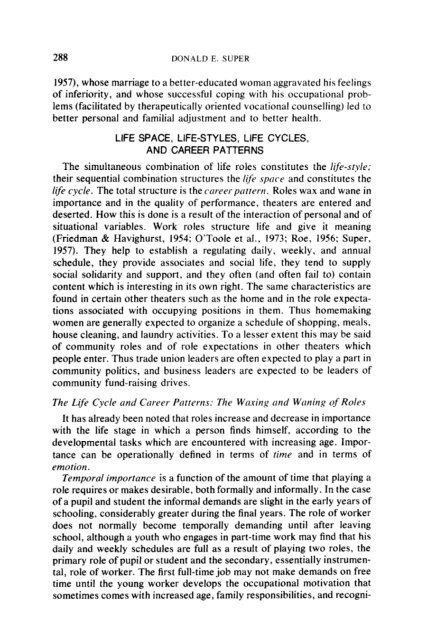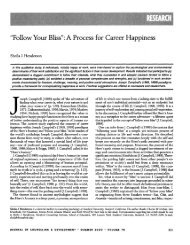A Life-Span, Life-Space Approach to Career Development
A Life-Span, Life-Space Approach to Career Development
A Life-Span, Life-Space Approach to Career Development
You also want an ePaper? Increase the reach of your titles
YUMPU automatically turns print PDFs into web optimized ePapers that Google loves.
288 DONALD E. SUPER<br />
1957), whose marriage <strong>to</strong> a better-educated woman aggravated his feelings<br />
of inferiority, and whose successful coping with his occupational prob-<br />
lems (facilitated by therapeutically oriented vocational counselling) led <strong>to</strong><br />
better personal and familial adjustment and <strong>to</strong> better health.<br />
LIFE SPACE, LIFE-STYLES, LIFE CYCLES,<br />
AND CAREER PATTERNS<br />
The simultaneous combination of life roles constitutes the life-style;<br />
their sequential combination structures the life space and constitutes the<br />
life cycle. The <strong>to</strong>tal structure is the career pattern. Roles wax and wane in<br />
importance and in the quality of performance, theaters are entered and<br />
deserted. How this is done is a result of the interaction of personal and of<br />
situational variables. Work roles structure life and give it meaning<br />
(Friedman & Havighurst, 19.54; O’Toole et al., 1973; Roe, 1956; Super,<br />
1957). They help <strong>to</strong> establish a regulating daily, weekly, and annual<br />
schedule, they provide associates and social life, they tend <strong>to</strong> supply<br />
social solidarity and support, and they often (and often fail <strong>to</strong>) contain<br />
content which is interesting in its own right. The same characteristics are<br />
found in certain other theaters such as the home and in the role expecta-<br />
tions associated with occupying positions in them. Thus homemaking<br />
women are generally expected <strong>to</strong> organize a schedule of shopping, meals,<br />
house cleaning, and laundry activities. To a lesser extent this may be said<br />
of community roles and of role expectations in other theaters which<br />
people enter. Thus trade union leaders are often expected <strong>to</strong> play a part in<br />
community politics, and business leaders are expected <strong>to</strong> be leaders of<br />
community fund-raising drives.<br />
The <strong>Life</strong> Cycle and <strong>Career</strong> Patterns: The Waxing and Waning of Roles<br />
It has already been noted that roles increase and decrease in importance<br />
with the life stage in which a person finds himself, according <strong>to</strong> the<br />
developmental tasks which are encountered with increasing age. Jmpor-<br />
tance can be operationally defined in terms of time and in terms of<br />
emotion.<br />
Temporal importance is a function of the amount of time that playing a<br />
role requires or makes desirable, both formally and informally. In the case<br />
of a pupil and student the informal demands are slight in the early years of<br />
schooling, considerably greater during the final years. The role of worker<br />
does not normally become temporally demanding until after leaving<br />
school, although a youth who engages in part-time work may find that his<br />
daily and weekly schedules are full as a result of playing two roles, the<br />
primary role of pupil or student and the secondary, essentially instrumen-<br />
tal, role of worker. The first full-time job may not make demands on free<br />
time until the young worker develops the occupational motivation that<br />
sometimes comes with increased age, family responsibilities, and recogni-



